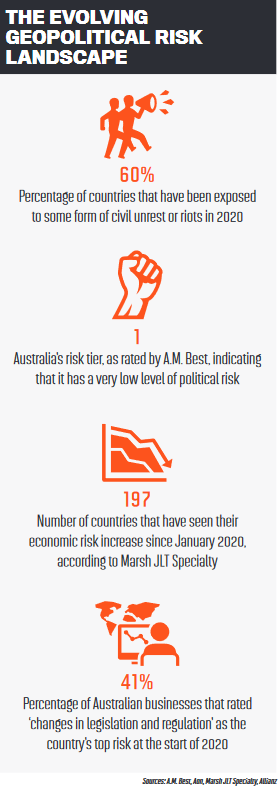

The geopolitical climate is the most turbulent it has been for several decades. From the threat of a full-scale trade war between China and the United States to the rise of global movements protesting matters from racial injustice to climate change, the current global political environment has no shortage of contentious issues.
The evolution of political risk over the last six months has primarily been driven by the COVID-19 pandemic and the response to it, says Jeremy Shallow, head of specialty at ArgoGlobal. While on some levels, the crisis has created a sense of the world uniting against a single ‘enemy,’ it has also been used as an opportunity for attack, Shallow points out, and the impact on people’s sense of security has been significant.
“From an insurance perspective, the general concern is the political instability element of the [COVID-19] crisis” Tarun Chopra, Clements Worldwide
“From an insurance perspective, the general concern is the political instability element of the crisis,” says Tarun Chopra, president and CEO of Clements Worldwide. “The pandemic and the response – or the lack of response, depending on the country and the region – is putting a lot of pressure on governments, econ-omies and households. This originally started with the perceived shortage of food, where there were lines of people looking to stock up, and then its impact on jobs and medical supplies. And that creates a source of political discontent and, in some cases, civil unrest.”
When examining the current geopolitical landscape, there’s no denying the impact of COVID-19, says John Minor, national practice leader for political risk at Aon. The pandemic has had a profound and severe impact on virtually every economy in the world. In addition to the staggering loss of life, it has impacted everything from healthcare infra-structure to economic production.
“COVID has led to an unprecedented amount of government interference on econ-omies,” Minor says. “That has had a huge impact on the geopolitical landscape. So, at least in the immediate short term, over the last six months, governments have intervened by shutting down aspects of the economy and forcing people to stay at home and businesses to shut down. And that has had a huge impact on a lot of economies around the world.”
 Minor says the immediate impact of government intervention in economies is being seen right now. In the long term, however, the question remains how this will continue in certain countries, particularly those that have elected populist leaders promoting protectionist policies.
Minor says the immediate impact of government intervention in economies is being seen right now. In the long term, however, the question remains how this will continue in certain countries, particularly those that have elected populist leaders promoting protectionist policies.
“In a way, COVID takes the more unseemly aspects of this to create a fear of the outsider, and so it almost reinforces an isolationist kind of mentality and sentiment,” Minor says. “And it really bolsters those populist and nationalist policies or those who promote them. But the big question is whether COVID, or the next virus, is going to continue to be used to justify isolationism and protectionism, both of which have a direct impact on cross-border trade and investment.”
COVID-19 could amplify the current wave of populist backlash to globalisation, Chopra says, because a lot of countries are trying to secure their borders and put some level of export and import controls in place, which could have implications on foreign ownership of local companies or the confiscation of assets by local governments.
“The big question is whether COVID is going to continue to be used to justify isolationism and protectionism” John Minor, Aon
“These are the kinds of risks that require attention, despite not having occurred yet, because they are relevant from a general business and economic perspective, as well as from an insurance perspective,” he says. “The insurance industry is looking to protect people and protect assets, and any discriminatory actions by governments towards foreign investors will have far-reaching implications on this.”
Shallow notes that with each new crisis, there is an expectation that it will spur increased interest in political risk products, but it doesn’t always directly follow. Political risk has been through a considerable growth period in the last couple of decades, he says, but the opportunity for higher penetration rates remains huge.
“The scale of the impact of this event has certainly highlighted significant underinsurance across the board,” Shallow says. “However, the challenge with converting that into new policies is that almost every company is under financial pressure at the moment. Brokers and underwriters need to convince clients of the worth of increasing spending on insurance – even at a challenging time – to protect themselves in the future.”
